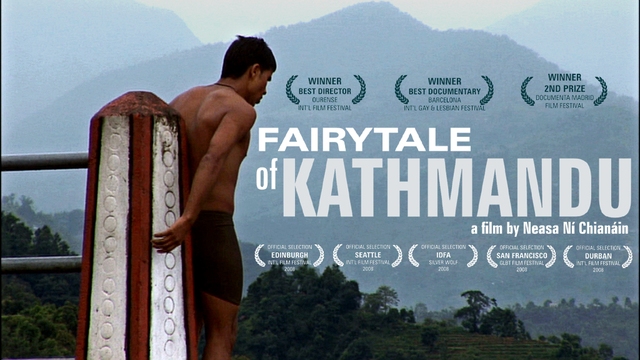Celebrated Irish poet Cathal O' Searcaigh invites his greatest fan Neasa to Nepal. And so a journey begins which neither will ever forget. But what Neasa expected to be the trip of a lifetime soon turns into a disquieting and idol-smashing experience. A haunting and beautiful documentary on a subject almost impossible to get this close to.
Neasa shows us a romantic bard, living secluded and still writing in Gaelic, affectionately known as 'the guru of the hills'. Sifting through old photographs Cathal finds one of his first year at school.
"The poor boy", he laughs, kissing the photograph,
"he didn't know what was going to happen to him".
The windswept Donegal hillside fades as we arrive into the bustling, riotously colourful streets of Kathmandu. Rickshaws ring their bells as homeless children dodge the market stalls and the warmth of Nepal is reflected in the faces of teenage boys. They look nervous and excited, as they wait to welcome Cathal back.
"Did you bring us chocolate Cathal?", they cry as they carry his bags to the hotel..
Cathal first came to Nepal to heal a broken heart but soon fell in love with the country itself.
"What first impressed me about Nepal is that the boys are very affectionate with each other", Cathal says. He sponsors many young men in their studies, buying them clothes and even housing.
"Cathal has many friends", Prem beams. Cathal refers to Prem as his 'spiritual son', and recently bought him a shop.
"It's a huge project to build a house" giggles one boy,
"with Cathal I can do it easily". In Nepal, the 12th poorest country in the world, Cathal is worshipped by those he befriends.
"He is as God to me," says Shantaram,
"with my heart and my body I love him". Then Cathal stays the night with a 17 year old village boy he just met.
"People they just close their eyes" the hotel owner says and now Neasa knows she has to confront the idol of her youth.
"I'm definitely not interested in what's called 'sex tourism," Cathal says. Most 17 year old Nepalese have no experience of girls and Cathal explains that
"it's very important to protect that innocence."
But when Neasa traces the boys they tell a different story. Most were on their way to college when they met Cathal - he gave them money for their studies then turned up at their college and invited them to his hotel.
"In the morning I asked Cathal 'what is sex?' -
"It's complex," he said'.
"Yes I had sex with some of them", Cathal stutters,
"but I wasn't coercing them. Why not? Why not?".
"This was not the story I wanted to tell", says Neasa and we feel her disappointment as Cathal's role sinks into ambiguity. Provocative in both content and technique, this finely crafted documentary is as much a portrait of a fallen idol as it is a glimpse into the murky world of sex tourism.
LEARN MORE.
WATCH MORE.
JOIN THE DISCUSSION.

Best Documentary, Barcelona Int'l Gay and Lesbian Festival

Best Director, Ourense Int'l Film Festival

2nd Prize, Madrid Documentary Film Festival
"A highly emotional trip into a complex relationship." - VARIETY
"Beautiful...a controversial trigger for debate." - EDINBURGH IFF REVIEW
"A controversial and brave documentary." - SEATTLE FILM FESTIVAL REVIEW
 Celebrated Irish poet Cathal O' Searcaigh invites his greatest fan Neasa to Nepal. And so a journey begins which neither will ever forget. But what Neasa expected to be the trip of a lifetime soon turns into a disquieting and idol-smashing experience. A haunting and beautiful documentary on a subject almost impossible to get this close to.
Celebrated Irish poet Cathal O' Searcaigh invites his greatest fan Neasa to Nepal. And so a journey begins which neither will ever forget. But what Neasa expected to be the trip of a lifetime soon turns into a disquieting and idol-smashing experience. A haunting and beautiful documentary on a subject almost impossible to get this close to.
 Best Documentary, Barcelona Int'l Gay and Lesbian Festival
Best Documentary, Barcelona Int'l Gay and Lesbian Festival
 Best Director, Ourense Int'l Film Festival
Best Director, Ourense Int'l Film Festival
 2nd Prize, Madrid Documentary Film Festival
"A highly emotional trip into a complex relationship." - VARIETY
"Beautiful...a controversial trigger for debate." - EDINBURGH IFF REVIEW
"A controversial and brave documentary." - SEATTLE FILM FESTIVAL REVIEW
2nd Prize, Madrid Documentary Film Festival
"A highly emotional trip into a complex relationship." - VARIETY
"Beautiful...a controversial trigger for debate." - EDINBURGH IFF REVIEW
"A controversial and brave documentary." - SEATTLE FILM FESTIVAL REVIEW




